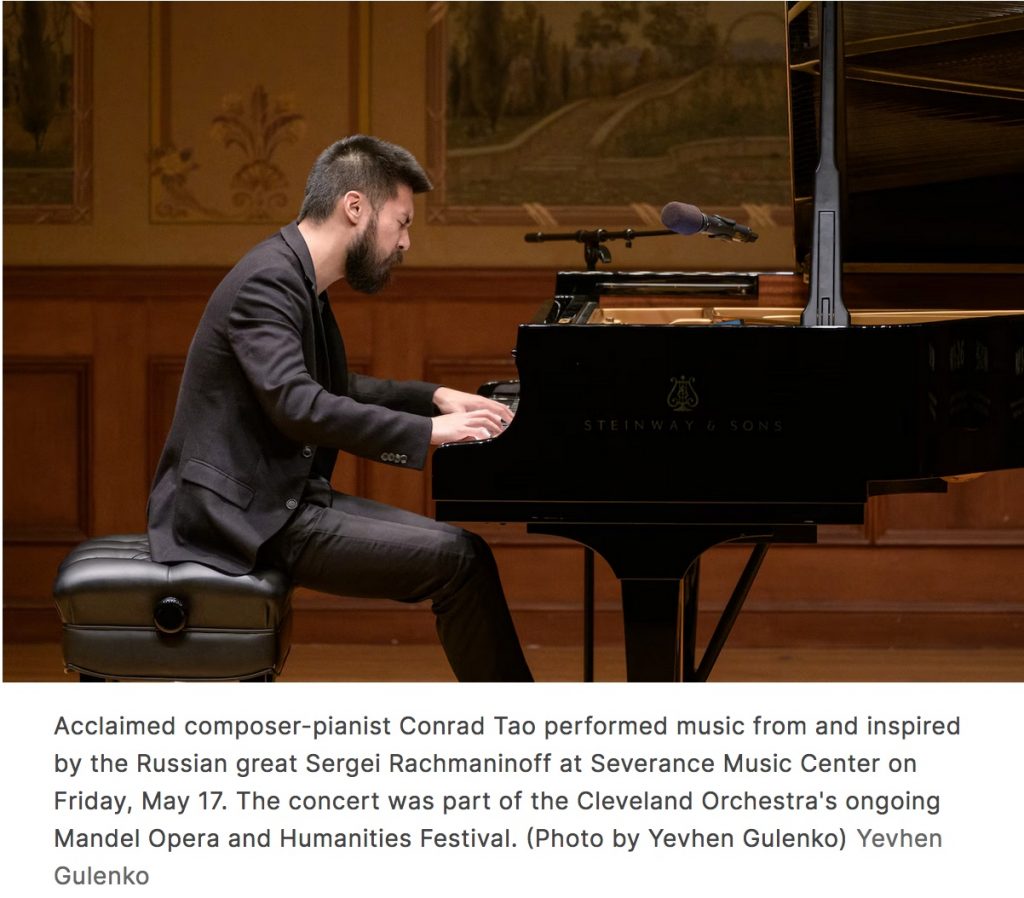
This article was originally published on Cleveland.com
CLEVELAND, Ohio — When the Italian harpsichord maker Bartolomeo Cristofori invented the piano in 1720, did he have any idea what his innovation might lead to 300 years later?
Did he imagine a future full of Mozart concertos, Schubert Lieder, Beethoven sonatas, or Liszt tone poems? Could he have believed that in 2024, a large audience would turn out in Reinberger recital hall at Severance Music Center to hear a concert of piano works by a famous Russian emigré interleaved with popular songs inspired by his tunes?
All of that has come to pass — and more. The Friday performance on May 17 featured the extraordinary Conrad Tao, who expertly curated and stunningly played a program of solo piano music by Sergei Rachmaninoff and composers who Tao said were influenced by his music.
Part of The Cleveland Orchestra’s Mandel Festival of Opera and Humanities, the concert was subtitled “Power and Influence,” but it might just as well have been dubbed “The Persistence of Melody.”
Tao made a wonderful emcee for the evening, telling his listeners just enough for them to understand his connection to each of the pieces. He noted that Rachmaninoff didn’t write a great deal of music after he moved to New York, but 8in the case of works like the Fourth Piano Concerto and the Paganini Rhapsody, you can hear the influence of jazz on his own writing.
The pianist started off with a flash, displaying his abundant technique in Rachmaninoff’s Prelude in C, Op. 32, No. 1, ending with quiet, well-balanced chords. Moving directly into the Prelude in A-flat, Op. 23, No. 2 — he brought clarity to its musical lines, never obscuring them with filigree.
In the Prelude in G, Op. 32, No. 5, Tao subtly stretched melodic lines, then made a seamless transition into his arrangement of Billy Strayhorn’s Take the “A” Train, a fascinating juxtaposition with the three preceding preludes.
The pianist said that the fifteenth variation from the Paganini Rhapsody was the first music he remembers improvising on. “I would just make up these crazy intros to it, which was a pivotal experience for me as a teenager at the Aspen Festival.”
In Stephen Sondheim’s “In Buddy’s Eyes” from Follies — the pianist noted that the character is trying to convince herself that she is happy, but the music says otherwise.
The pianist’s luxurious lines were simple and flowed organically in his arrangement of Robert Schumann’s haunting “Auf einer Burg” from Liederkreis Op. 39.
Rachmaninoff’s Études-Tableaux, Op. 39, No. 2 in a, received a phenomenal performance that continually pulled at your emotional compass with its many crescendos and decrescendos.
Then Tao’s arrangement of Irving Berlin’s All By Myself brought a hint of Tin Pan Alley into Reinberger Chamber Music Hall and showed that the pianist knows how to swing with the music.
Moving directly into his Improvisation on Rachmaninoff’s Variation 15 from the Paganini Rhapsody, Tao’s astonishing technique again proved to be total. He brought clarity to the fast passages and quickly changed gears for the quiet concluding chords.
The third set took us from Reinberger to a piano lounge with Harold Arlen’s “Somewhere Over the Rainbow.” Here, Tao never lost track of the melody and crafted a beautiful transition into his Improvisation on Rachmaninoff’s Variation 18 from the Paganini Rhapsody. His playing was simple, yet beautiful, and he achieved a large but sensitive sound.
Tao brought his own voice to his arrangement of Billy Strayhorn’s “Lush Life.” Hearing his singing of Strayhorn’s lyrics (“those who are lonely too”) added a deeper poignancy to the reflective song.
Tao wrapped up the first half of his program with sensitive playing of Rachmaninoff’s “Daisies,” a jazz club version of Strayhorn’s “Day Dream,” and an amazing reading of Rachmaninoff’s Etudes-Tableaux, Op. 33, No. 3 in c.
After intermission came the popular adaptation of Rachmaninoff’s big tune from the second piano concerto that everybody would recognize: Buddy Kaye’s and Ted Mossman’s “Full Moon and Empty Arms,” beautifully played by Tao and Cleveland orchestra cellist Dane Johansen, then the duo wrapped up the evening with the Cello Sonata, one of only a small number of chamber music pieces that Rachmaninoff wrote.
Their performance sounded as though the two were frequent collaborators who are able to anticipate each other’s every move. Long, flowing lines in the first movement led to the emotional, spooky theme of the second, which ended with a puckish final staccato note.
The third movement was intense and lyrical. As it progressed, you found yourself falling into the tradition of making up lyrics. The duo’s fantastic, gripping performance of the fourth movement was followed by a long ovation from the enthusiastic crowd.
Daniel Hathaway is the founder and editor of the online journal ClevelandClassical.com. He teaches music journalism at Oberlin College and Conservatory of Music
Published on ClevelandClassical.com May 20, 2024
Click here for a printable copy of this article


